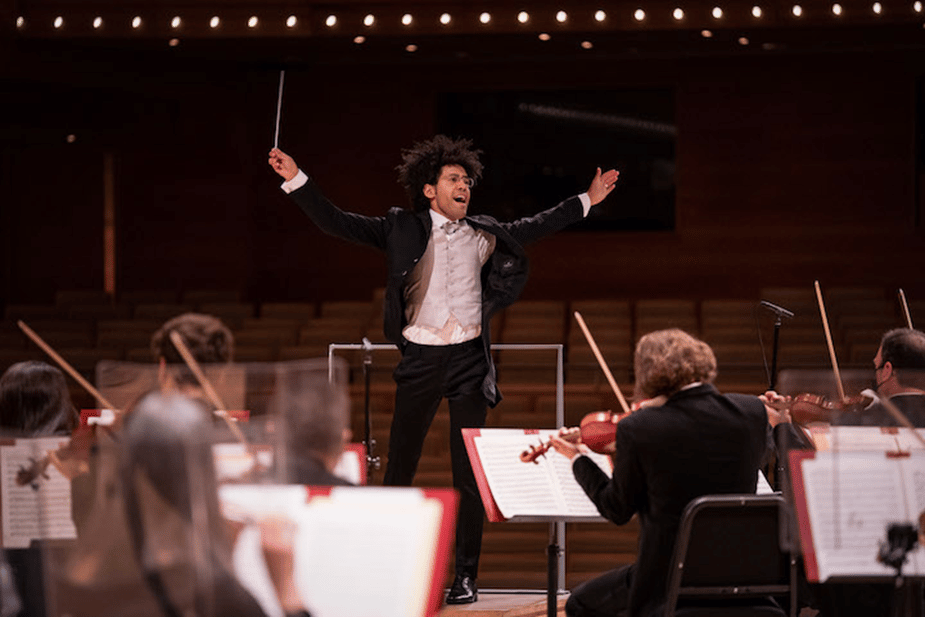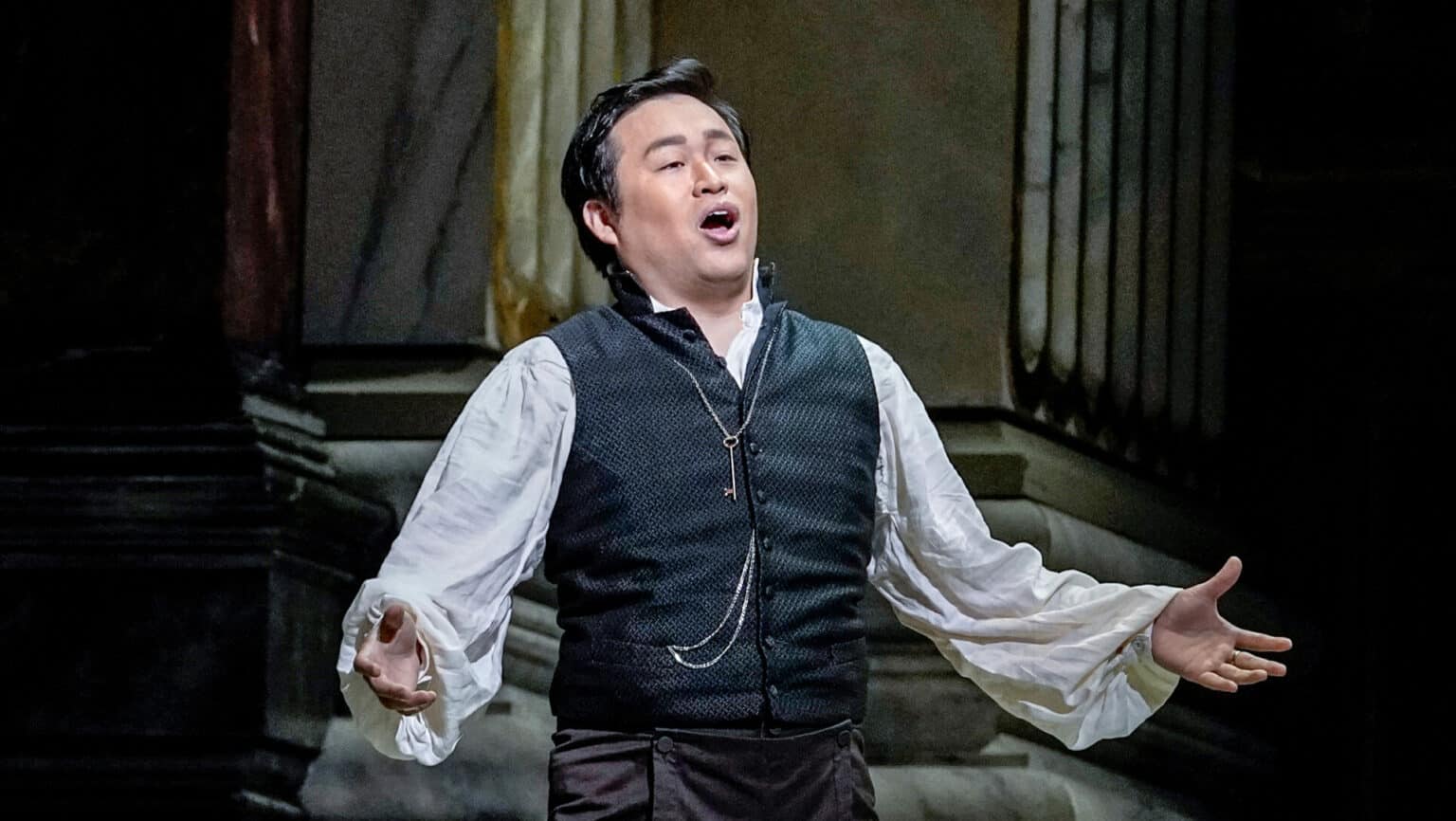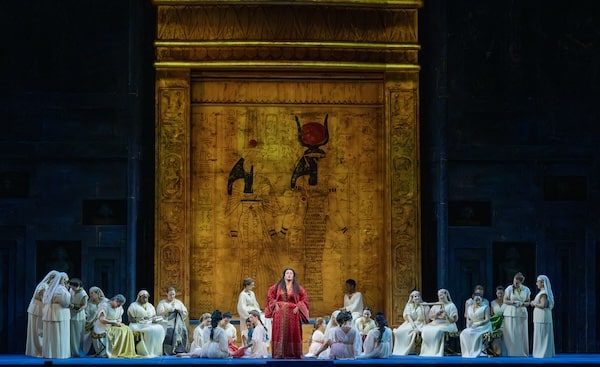Rising conductor follows in Tár’s footsteps
OrchestrasThe Venezuelan conductor Rafael Payare is bringing his Montreal Symphony Orchestra to the Kennedy Center and Carnegie Hall next month.
Nothing unusual about that.
Except that he has chosen to highlight Mahler’s fifth symphony, exactly as Cate Blanchett does in the movie, and to bck it up with a high-profile recording, his first with the orchestra.
Total coincidence, say his people.
Just like Tár, Payare fills his chat about the symphony with factoids:
Mahler’s Fifth Symphony is a deeply personal work, written at the prime of the composer’s life. The extremes in the music – from the darkness of the funeral march to the ecstatic joy of the finale – very much reflect the highs and lows of his own life at the time, which range from surviving a near-death experience to marrying his beloved Alma and becoming director of the Vienna Court Orchestra.
‘The Fifth is the last of Mahler’s symphonies to have an almost naïve quality; his subsequent symphonic works would take a much darker, more existential turn. But in the Fifth, we have a composer who, while a fully mature artist, is still looking forward to what the future might bring. This is music brimming with exuberant energy, hope and a deep love of life.
1 Mahler wrote most of his 5th symphony in the summer of 1901, well before he married Alma in March 1902.
2 The Adagietto is not a funeral march.
3 He had been appointed director of the Vienna Opera (not the orchestra) in 1897.
4 If the 5th is Mahler’s last ‘naive’ work, what do we make of the 7th and 8th symphonies?
5 Which Mahler symphony does not have ‘a deep love of life’?
Payare’s blurb is worthy of Blanchett at her worst.






The Adagietto is not a Funeral March, but the first movement is, Norman.
Exactly!
Lmao, has NL actually listened to this piece
Doesn’t even sound like he knows his basic facts, let alone the music
Of course, if we’re going to quibble over accuracy, we could point out Payare played Mahler’s Fifth last June in Lanaudière (https://www.ledevoir.com/culture/musique/729030/une-ouverture-baume-au-coeur), and that the CD – which has been public knowledge for several months – was recorded last summer in August (https://ici.radio-canada.ca/nouvelle/1953993/orchestre-symphonique-montreal-rafael-payare-symphonie-no-5), and that the same symphony will be played in Montréal in March, and that it therefore has absolutely nothing whatsoever to do with Cate Blanchett. But hey, who’s counting?
Oh, and the orchestra is the Orchestre symphonique de Montréal, in any language. It has not been called the Montreal Symphony Orchestra since the 1990s.
Strange how often one sees OSM in its media.
Oui? OSM like Orchestre Symphonique de Montréal? Why is that strange?
“OSM” is correct – it’s the French abbreviation, and the one the Orchestra uses in any language. “MSO” or “Montreal Symphony Orchestra” is incorrect (The Kennedy Center gets it right, Carnegie Hall doesn’t, using “Montreal Symphony Orchestra”, though they abbreviate it as “OSM”).
I’ve loved the “OSM” abbreviation ever since in the early 1980s I heard the late Henri Bergeron introduce its radio broadcasts with “L’Orchestre Symphonique de Montreal.” As a boy from Seattle, it sounded so exotic.
Only to the French-Canadians, who seem to feel that the world must revolve around their Francophile ways.
Well Frank, in that case, let’s call l’Orchestre de la Suisse Romande the “French speaking Switzerland Orchestra” and the Orchestre National de France the “French National Orchestra”. And French-speaking folks could translate the name of a very well-known chamber orchestra by “Académie de St-Martin-dans-les-champs’…
The point is not about you disliking French-Canadians, Frank. It’s about being acurate.
This community is under siege and should defend itself…
I saw Tar a couple days ago.
As a conductor myself, I thought Blanchett did a great job in the conducting bits. More problematic was the way the characters talk about music. A lot of name-dropping, and while they use all the right words, the sentences they build with these words are very artificial. I’ve never met any musician who talks like that.
Unlike some other commenters, length wasn’t an issue for me. I thought the movie does a great job of holding attention for the whole duration. I do wonder what non-classical musicians thought of the talking bits though.
My favourite part was probably Tár herself. A very ‘grey’, nuanced, human character.
Great writing also. Sometimes essential parts of the narrative are revealed with short sentences that are easy to miss if you don’t pay attention.
As for Payare, having listened to some of his work, I think he is grossly overrated.
“More problematic was the way the characters talk about music. A lot of name-dropping, and while they use all the right words, the sentences they build with these words are very artificial. I’ve never met any musician who talks like that.”
That’s exactly the point and what the film was criticizing.
Every conductor who ever shook Bernstein’s hand claims to have been his protege. And this is the real reason why Alsop in particular has taken so much umbrage with the film — she has been accused of overstating her relationship with Bernstein for PR purposes.
Conductors are shameless name-droppers. Read any program notes — any conductor who has a connection with the greats of the post-war era make a point to mention it. My favorite are conductors who were too young to have studied with them, but still try to claim a connection because they attend a concert.
And as for the “artificial” things said about the music, yeah, conductors definitely do that. With those “documentaries” showing the rehearsal process, there are countless examples where the conductor spends a dozen minutes lecturing the orchestra about the history of the piece and what the composer was feeling when they wrote it for the benefit of the cameras.
Hmm…I’m trying to reconcile the “problematic […] way the characters talk about music” and “I’ve never met any musician who talks like that” with “Great writing also”…
Have you ever read this website? It’s a collection of the vapid, self-aggrandizing, factually incorrect things conductors/soloists say and do. That’s what this post was originally about.
Payare. Totally overrated but ticks The Boxes.
Payare is Music Director of two very good orchestras and has worked with many of the world’s leading ensembles including the Vienna Philharmonic, Staatskapelle Dresden, Tonhalle Orchestra Zurich, Leipzig Gewandhaus Orchester, London Symphony Orchestra, Munich Philharmonic, Orchestra dell’Accademia Nazionale di Santa Cecilia and Sinfonieorchester des Bayerischen Rundfunks. He has worked also continously with the major orchestras of Boston, Pittsburgh, Cleveland, Philadelphia, and Los Angeles. Calling him a rising conductor is not a journalistic masterstroke.
OK, let’s see…
1- the 5th was finished in the summer of 1902 AFTER he married Alma, and the Adagietto is considered by many to be a love letter to his wife;
2- the funeral march Payare refers to is the opening movement, not the Adagietto;
3- the Vienna Opera was first named Vienna Court Opera when Mahler started in 1897. I agree that Payare mentions “orchestra” instead of Opera, but he also talks about highs and lows of that period in the composer’s life. He never said the work was composed at the same time;
4- considering Mahler’s output, the 5th definitely has more naïve aspects than nos. 2-3-6-8-9-10 (and the 7th is open to discussion);
5- Payare never said that other Mahler symphonies do not have “a deep love of life”.
See? It’s easy to call someone’s explanation a blurb when you twist that person’s words. Oh, and speaking of Montreal : I will take Payare’s music-making over Nagano’s any day of the week, thank you very much.
But does Montreal Love Rafa? This is where you should really start.
We do. We really, really do.
“2 The Adagietto is not a funeral march.”
Of course it isn’t. Payare was certainly referring to the opening movement (titled Trauermarsch) when he mentioned the funeral march.
I agree with your other points.
It’s always interesting to listen to conductors give talks about music because so many of them say things that just aren’t correct. But so many listeners get sucked in and believe every word. I haven’t heard Payare in concert yet, gotta make that trip to San Diego.
Which is precisely the point Tar makes.
If you take the interview at the beginning of the film with Adam Gopnik at face value, then you’ve missed the forest for the trees.
Mahler 5 gets played a lot on tour – it’s a great showcase that uses a large orchestra but no extras. And this has been on the tour program ever since it was announced (so nearly a year). It seems to be Norman rather than Payare who’s trying to tie it to Tar.
And I couldn’t watch the movie for more than about 5 minutes.
I agree. Since there is a new recording of the Mahler 5th released just about every other week, there really is no basis for relating it to Tar.
Mr. Lebrecht has already posted plenty about his evidently personal, intense dislike for Tár. Here, though, he appears to be unfairly tarring a fine musician and orchestra with the same brush.
How is it, exactly, that next month’s US performances of the Mahler 5th by Rafaele Payare and the OSM have anything whatsoever to do with the movie, released in North America last October? After all, the orchestra recorded the work last summer, well before the film’s release, and its forthcoming engagements at Carnegie Hall and the Kennedy Center were likely arranged at that time or even before. Absent some inside knowledge the author has declined to share, it would seem these performances have nothing whatsoever to do with Tár. Not the movie, nor the character. Nothing.
Conflating these programs with Tár was far more of a stretch than any of Payare’s thoughts about Mahler, all of which seem more accurate and relevant than Mr. Lebrecht’s representations. One might wonder how – or why – Lebrecht might have confused the 1st mvt Trauermarsch, or ‘Funeral march’ with the 4th mvt Adagietto. Likewise, it appears oddly perverse to ignore the fact that Mahler and Alma met and fell in love in 1901, then conceived their 1st child and married shortly after, in early March, 1902. All of this occurred while he was right in the midst of composing the 5th Symphony, which completed later that year. Was the Adagietto meant as a kind of love letter to Alma and their growing family? Based on the available evidence, it is reasonable to think so, if not befogged by spite.
Performance art is all interpretation. One word can be pronounced differently by different people. How he hears/interprets Mahler is different from other people. In this day and age it is nice to see anybody recording.
Lol, Norman….of course the Adagietto is not a funeral march. Payare didn’t say it was. He’s obviously referring to the 1st movement, which literally says “Trauermarsch” and “Wie ein Kondukt” at the header.
I have been so frustrated trying to attend a concert conducted by Maestra Tár! She isn’t scheduled to appear with our local orchestra (the Holcomb Kansas Symphonette)… Do any of you have any idea where her closest concert would be in the coming months or years? She was so amazing in the movie (even though I fell asleep during the opening credits). I heard she’ll be making her Met debut with the prequel to ‘The Hours’…………………
Oh yes, let’s please confuse Cate Blanchett with the character she plays in a movie because Cate Blanchett and the fictional Lydia Tar are one and the same.
“Payare’s blurb is worthy of Blanchett at her worst.”
Do you mean Blanchett’s character, reading the film script in the manner required by the film’s director?
The “journalism” on display from Norman is always at an all time low. He can’t even do the bare minimum, and makes the most bad faith arguments possible. Do yourself a favor and think just a little bit Mr. Lebrecht.
Payare is cellist Alisa Weilerstein’s husband and a Dudamel protege’. Based on that alone he’s going places.
Adagietto is a love song but usually played like a funeral dirge.
He and Dudamel are about the same age, but Dudamel got started quite young; he did play under him in the SBYO and was a Dudamel Fellow, but protege?
In any case, Payare may soon have the better orchestra.
Payare and Dudamel were dormitory mates as youths at El Systema in Venezuela. Rafael’s nickname at the dorm was “McGyver” because he could fix anything. I believe they are still close.
Klaus Mäkelä did Mahler 5 this week in Cleveland,Michael Francis will do it in Ludwigshafen next month, Myun Whun Chung did it with Concertgebouw last Christmas……Mahler 5 gets a performance every week somewhere……Linking this to “Tar” seems quite far fetched….
It took me about 4 seconds to google that Mahler 5 was completed in the summer of 1902, well after his marriage to Alma. The first movement is marked “Trauermarsch”, german for funeral march. The author might be interested to know that Mahler’s 5th symphony actually has four more movement in addition to the famous Adagietto.
Weird that this concludes high and mighty but missed the facts of the writing of the symphony, an easy Google and even wiki
The name sounds beautiful (in french)
My goodness are we going to have to think of this movie every time we hear Mahler 5? It was barely featured in the movie. Not a favorable comparison to desire.
I think Adagietto was Mahler’s Valentine’s Day present to Alma. Having said that, is Mahler the most (over)played composer in concerts today?